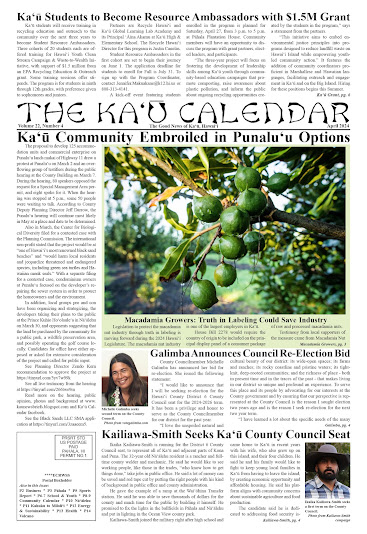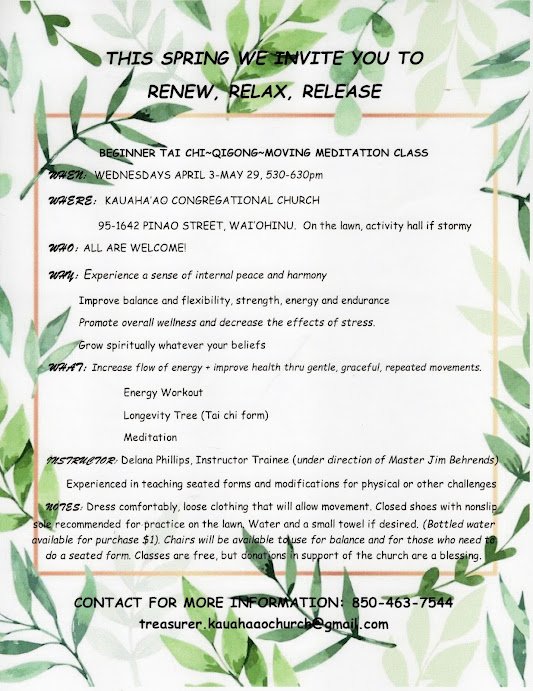Trojans started the season on the road against Kaumeke, winning 26-16-, 26-24, 25-20 and 25-17. Kaʻū followed up by taking down Kohala 25-19, 25-19 and 25-16. The only loss is to Konawaena with 17-25, 14-25 and 10-25 at home. Trojans beat Parker 21-25, 25-22, 25-22, 20-25 and 15-10 and bested Makualani 25-15, 25-8 and 26-16.
Kaʻū goes on the road for the next three challenges, with all games at 5 p.m., traveling to play Kanu o Ka ‘Āina on Saturday, April 6, then to HPA on Wednesday April 10 and on to Pāhoa Monday April 15. The next home game is at 5 p.m. on Wednesday, April 17, followed by the Play-offs.
To read comments, add your own, and like this story, see facebook.com/kaucalendar. See upcoming events, print edition and archive at kaunews.com. See 7,500 copies the mail and on stands.
THIS IS NATIONAL NATIVE PLANT MONTH. U.S. Senator Mazie K. Hirono, member of the U.S. Senate Energy and Natural Resources Committee, announced Senate passage of her bipartisan resolution designating April 2024 as National Native Plant Month. The resolution, which passed the Senate unanimously and was also led by Senator Mike Braun (R-IN), recognizes the importance of native plants to environmental conservation and restoration, as well as in supporting a diversity of wildlife. On Tuesday, Hirono and University of Hawai‘i President David Lassner together planted ‘ohia lehua trees and toured the grounds of Lyon Arboretum to launch the month of appreciation of native plants.
 |
| April is National Native Plant Month each year. Read a Kamehameha Schools article about its importance in Hawai‘i at https://www.ksbe.edu/article/laau-love-lets-celebrate-native-hawaiian-plant-month |
Hirono said, "Hawai‘i is home to more than 40 percent of our country's endangered and threatened plant species, and native plants are significant to our state's history, culture, and environment. "In Hawai‘i, we recognize the importance of preserving our unique biodiversity and understand the need to continue raising awareness of native plant populations." She said the resolution "highlights the importance of native plants in our communities and encourages all Americans to learn more about native plants in their own communities."
The bill is endorsed by more than 200 organizations across the country, including 16 organizations from Hawai'i: Aha Punana Leo, Ahahui o na Kauka, Bishop Museum, Boys & Girls Club of Hawai‘i, Council
 |
'Āhinahina, the Kaʻū Silversword. only grows on Mauna Loa between 5,000 and 8,000 feet in elevation.Photo from HVNP |
As a member of the Senate Energy and Natural Resources Committee, Hirono has championed legislation to protect Hawai‘i's environment, fish, wildlife, and plants, while also working to support local farmers and agriculture, and speed the transition to clean, renewable energy in Hawai‘i and across the country.
In February 2024, she announced that the U.S. Department of the Interior is awarding over $4 million in funding to programs and initiatives across Hawai‘i to prevent the imminent extinction of Hawaiian forest birds. In September 2023, Hirono introduced the AuGmenting Research and Educational Sites to Ensure Agriculture Remains Cutting-edge and Helpful Act, legislation to provide billions in funding to address deferred maintenance at U.S. schools of agriculture, including the University of Hawai'i College of Tropical Agriculture & Human Resources, and USDA Agricultural Research Service facilities. In May 2023, Hirono introduced the Extinction Prevention Act, bicameral legislation to provide funding for some of the country's most imperiled yet vastly underfunded wildlife species, including threatened and endangered North American butterflies, various Pacific Island plants, freshwater mussels, and Southwest desert fish.
To read comments, add your own, and like this story, see facebook.com/kaucalendar. See upcoming events, print edition and archive at kaunews.com. See 7,500 copies the mail and on stands.NAUPAKA IS PLANT OF THE MONTH for Lāʻau Letters: Native Plants of Kaʻū by Jodie Rosam with illustration by Joan Yoshioka:
Description: I realize that some of the plants you read about here are a little more elusive and more difficult to spot (with confidence) in the wild, but here is one we all know and love, naupaka! Naupaka is an indigenous shrub in the Goodeniaceae family. Naupaka are most commonly seen growing in tight groups about 2-6’ tall, but if you trace a single plant down to its primary stem, you may realize that a single plant can spread 15-20’ wide. The leaves are unmistakable and somewhat succulent. They are an array of gorgeous light green ovals, covered with silky hairs on the axil (the area between the leaf stem and petiole or branch), and can range anywhere from 2 to about 8” long. The fruits are white, round, and pulpy. Naupaka kahakai bloom year-round with beautiful half-flowers that are shades of white with purple accents. Here is a homework assignment: learn the moʻolelo of naupaka kahakai (beach naupaka) and naupaka kuahiwi (forest naupaka).
Of the ten native species of Scaevola, this featured species is the only one to produce white fruits and is not primarily bird-dispersed; the others produce more purple fruits and are a favorite forest bird snack. The fruits of this naupaka readily float and remain viable for long periods of time, hitching rides on ocean currents before settling along a shoreline, which speaks to its large distribution across the tropics. In fact, studies have shown that naupaka seeds are the most viable after spending an average of 250 days on the ocean!
Uses: Naupaka can be used medicinally and in lei. The fruit and/or bark of naupaka can be crushed and
used on cuts and abrasions, and is especially effective when mixed with paʻakai (sea salt). The flowers, leaves, and fruits can be used in lei-making, and when the right plant is chosen for harvesting, the lei has a fresh floral fragrance. Naupaka fruits, flowers, and leaves can yield a light-to-dark green dye. For all of you divers/snorkelers out there, the fresh fruits contain a natural sunscreen and the broken leaves can be rubbed on the inside of your mask to keep it from fogging (no need for hāʻae, or spit)!
Habitat: Naupaka is a common coastal adornment throughout the archipelago and across the pantropics. It thrives in areas that seem to be extreme and harsh - enduring hot, dry conditions, wind, and heavy salt spray. In Kaʻū, naupaka can be seen along all of our coastlines, providing erosion control, habitat for honuʻea (Hawaiian hawksbill sea turtles) and sea bird nests, and a food source for the nalo meli maoli (Hawaiian yellow-faced bee).
Growing and Purchasing: Naupaka grows easily from seeds and quickly from cuttings. Take 5-6” cuttings that are less woody than the main stem, and pop them into a jar of water on your windowsill for a couple of weeks (changing the water daily) or directly into a pot with a lot of perlite and good drainage. Sow seeds (after removing them from the fruits) in flats or germination trays in a similar media to that for cuttings, and place them in filtered sunlight, keeping them slightly damp. Seeds will only germinate in freshwater, but once the plant is established, it doesn’t mind (and actually likes) salt spray. Naupaka make a great, low-maintenance, pollinator-friendly accent to your home or property/landscape. They thrive in heat and full sun, and few pests bother the thick, waxy leaves. I encourage you to make some naupaka friends of your own, and see if any of them want to come home with you. Happy planting!
Description: I realize that some of the plants you read about here are a little more elusive and more difficult to spot (with confidence) in the wild, but here is one we all know and love, naupaka! Naupaka is an indigenous shrub in the Goodeniaceae family. Naupaka are most commonly seen growing in tight groups about 2-6’ tall, but if you trace a single plant down to its primary stem, you may realize that a single plant can spread 15-20’ wide. The leaves are unmistakable and somewhat succulent. They are an array of gorgeous light green ovals, covered with silky hairs on the axil (the area between the leaf stem and petiole or branch), and can range anywhere from 2 to about 8” long. The fruits are white, round, and pulpy. Naupaka kahakai bloom year-round with beautiful half-flowers that are shades of white with purple accents. Here is a homework assignment: learn the moʻolelo of naupaka kahakai (beach naupaka) and naupaka kuahiwi (forest naupaka).
Of the ten native species of Scaevola, this featured species is the only one to produce white fruits and is not primarily bird-dispersed; the others produce more purple fruits and are a favorite forest bird snack. The fruits of this naupaka readily float and remain viable for long periods of time, hitching rides on ocean currents before settling along a shoreline, which speaks to its large distribution across the tropics. In fact, studies have shown that naupaka seeds are the most viable after spending an average of 250 days on the ocean!
Uses: Naupaka can be used medicinally and in lei. The fruit and/or bark of naupaka can be crushed and
 |
| Naupaka grow all along the Kaʻū shoreline. Photo from DLNR |
Habitat: Naupaka is a common coastal adornment throughout the archipelago and across the pantropics. It thrives in areas that seem to be extreme and harsh - enduring hot, dry conditions, wind, and heavy salt spray. In Kaʻū, naupaka can be seen along all of our coastlines, providing erosion control, habitat for honuʻea (Hawaiian hawksbill sea turtles) and sea bird nests, and a food source for the nalo meli maoli (Hawaiian yellow-faced bee).
 |
| http://www.kaucalendar.com/news/news.html |
Growing and Purchasing: Naupaka grows easily from seeds and quickly from cuttings. Take 5-6” cuttings that are less woody than the main stem, and pop them into a jar of water on your windowsill for a couple of weeks (changing the water daily) or directly into a pot with a lot of perlite and good drainage. Sow seeds (after removing them from the fruits) in flats or germination trays in a similar media to that for cuttings, and place them in filtered sunlight, keeping them slightly damp. Seeds will only germinate in freshwater, but once the plant is established, it doesn’t mind (and actually likes) salt spray. Naupaka make a great, low-maintenance, pollinator-friendly accent to your home or property/landscape. They thrive in heat and full sun, and few pests bother the thick, waxy leaves. I encourage you to make some naupaka friends of your own, and see if any of them want to come home with you. Happy planting!
To read comments, add your own, and like this story, see facebook.com/kaucalendar. See upcoming events, print edition and archive at kaunews.com. See 7,500 copies the mail and on stands.

.jpg)

.heic)



.jpeg)


